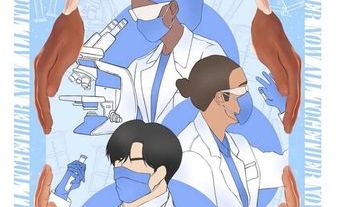I thought I was indestructible until I was 22. The year was 2001 and I went on holiday to New Yorkin September. I was caught up in the 9/11 terror attacks. I had been stood between the Twin Towers 15 minutes before and I ran from the towers as they collapsed, only to be caught in the dust cloud in Battery Park. I am officially recognised as a survivor according to the US Government.
I was diagnosed with post-traumatic stress disorder in January 2002. I saw my GP and rather incoherently told him about dreaming of planes crashing and waking up screaming. Over the years, I have had hypnotherapy, cognitive behavioural therapy, talk therapy and exposure therapy. In 2021, I had eye movement desensitisation and reprocessing therapy following an extreme reaction to mask wearing; there is a specific photograph of me being evacuated over the Brooklyn Bridge wearing a mask.
Finding acceptance
Yet, I have never really confessed this experience until the last three years. I feel that I was driven into shame and denial that it ever happened. I was unable to get time off from university; I struggled on placement away from family and friends. I felt that I was judged before I had even left the starting blocks. I told a select few people who I trusted but essentially kept it hidden.
I felt that if talking about my experiences could help just one person then that was enough of a reason to speak out. Acceptance breeds acceptance.
So, what changed for me to be able to speak out about my own mental health problems? Well, that would be me leaving an emotionally abusive marriage and suffering from work-related burnout three times in as many years. I felt that if talking about my experiences could help just one person then that was enough of a reason to speak out. Acceptance breeds acceptance.
Dealing with burnout
Burnout in the NHS is higher than ever and we are reaching crisis levels. As doctors, we see things we are not prepared for, more so during the pandemic. Imagine you have a plate and you keep filling it – eventually, something falls off. Now imagine that plate was broken and is held together with superglue. That plate will not hold as much, so more falls off and there is a risk of the plate breaking again. (I prefer the analogy of Japanese Kintsugi, and my plate being held together by gold, probably more gold than plate.) That is burnout in a nutshell. It is physically and emotionally exhausting. I have spent days on the sofa, barely able to move. It is always something trivial that tips me over the edge; pressure builds up and it has to escape somehow. My latest burnout saw me under the Crisis Team for the first time ever; that is a lonely and scary place to be and not somewhere I want to be again. You blame yourself for everything, even though it is not your fault.
Doctors with burnout need support, not silence. They need validation and understanding ... We do not need stronger or bigger plates, we need less on them.
Improving attitudes
I have seen how attitudes to mental health have changed over the last 20 years; there is certainly more openness about it being okay to not be okay, but this needs backing up with better actions. Doctors with burnout need support, not silence. They need validation and understanding. We need to change the underlying situation rather than talk about increasing emotional resilience. We do not need stronger or bigger plates, we need less on them.
Most importantly, we need to remember that doctors are not indestructible. We are human. It is not selfish to put our own mental health needs first.


